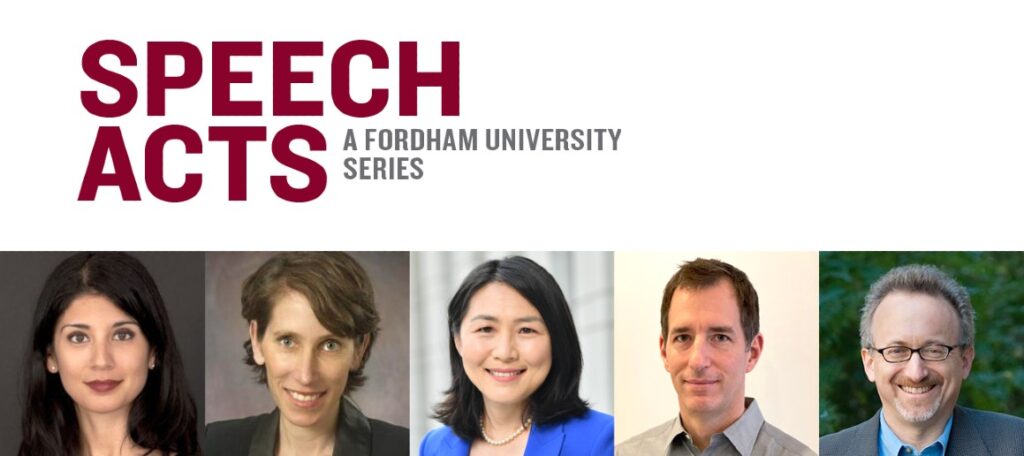In one of the latest installments of Fordham University’s Speech Acts Series, Fordham Law professors took a closer look at free speech from a legal lens. The event, “The Promise and Limits of Our First Amendment,” held on January 26, was sponsored by the University’s Office of the Provost.
The conversation focused on the state action doctrine, a legal rule according to which “almost all constitutional rights apply against the state and not against private persons,” according to moderator Abner Greene, Leonard F. Manning Professor of Law at Fordham Law. The panelists considered defenses for and critiques of the doctrine, and in particular whether the First Amendment tradition has anything to say about private actions to curb harm caused by the speech of other private citizens.
“One theme of today’s discussion will be whether the so-called state action doctrine is defensible, or whether we ought to think across the public-private line when we think about constitutional rights,” said Greene. “Or, whether we should adjust how we think about the state action doctrine.”
Modernizing the First Amendment
Scholars of state action doctrine have primarily concerned themselves with what the state can and cannot do to limit speech. However, the question of whether powerful private companies like Facebook and Twitter can curtail speech has increasingly become a major subject of interest.
“What we’ve seen in the last few years is a focus on social media platforms and this view that social media platforms are so powerful, that they structure so much of our ability to communicate and express ourselves freely, that there should be an expanded notion of the state action doctrine to include some obligations on the part of these social media platforms,” primarily in terms of restraining their ability to moderate content, said Mary Anne Franks, Professor of Law and the Michael R. Klein Distinguished Scholar Chair at the University of Miami School of Law.
Nonetheless, unmoderated speech on those same platforms can also affect individuals. “There are ways that people can chill each other’s speech—through harassment, through privacy invasions, through all kinds of forms of speech—that might have an impact on whether or not a person can speak freely,” said Franks. She pointed out that the traditional view is that these kind of abuses don’t implicate the First Amendment, as this chilling effect isn’t created by state action.
Fordham Law Professor Julie Suk noted that legal scholars outside the United States have suggested that some constitutional rights can actually be understood as principles, rather than rights and can be “advanced proportionately both by protecting the individual exercise in some instances, but also by enabling regulation by the state in other instances.”
“That kind of weighing of the strength of public interest—compared to the strength of [individual expression]—is a widespread tool in the analysis of free speech that many scholars suggest could be a useful approach to modernizing our First Amendment,” said Suk.
Public vs. Private Forums
In the roundtable discussion portion of the event, Greene asked the panelists about Pruneyard Shopping Center v. Robins, in which the U.S. Supreme Court ruled that when California gave a group of high school students a state law right to protest at a mall, the federal First Amendment did not give the mall owner a right to exclude the speech. “I’ve often wondered whether people think that Pruneyard could serve as a model for congressional action, to insist that large social media platforms act as public forums,” said Greene.
Professor Genevieve Lakier from the University of Chicago Law School brought up an inconsistency that exists in modern First Amendment law. Though there is a “long tradition of public accommodations law and of recognizing that public-facing businesses may have statutory duties to allow speech,” there is also a tradition of the “highly deregulatory, individual speaker, autonomy-promoting, laissez-faire First Amendment,” Lakier said.
Nelson Tebbe, Jane M.G. Foster Professor of Law at Cornell Law School, explained that there is a familiar template for recognizing that private actors perform public functions, such as civil rights laws requiring businesses to serve customers without discrimination. In that tradition, he said, we can imagine laws that require digital platforms like Facebook to safeguard democratic discourse, even though the platforms are corporate actors and not government entities. Tebbe went on to suggest that the First Amendment may allow governments to regulate private platforms in the public interest in this way.
The year-long Speech Acts Series, which began during the fall 2021 semester, has included a number of panels and high-profile speakers including Pulitzer Prize-winning New York Times journalist Nikole Hannah-Jones and television host and commentator George Stephanopoulos. The series will conclude on April 6 with a panel discussion about freedom of expression on campus, which Greene will also moderate.

